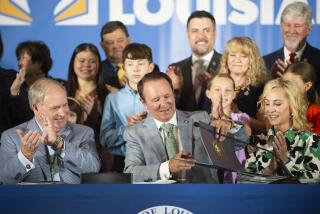Supreme Court will decide if religious freedom shields Catholic schools from teacher suits
WASHINGTON â In 2014, Kristen Biel told her principal at St. James Catholic School in Torrance that she had breast cancer and would need time off for chemotherapy.
The school dismissed her two months later, citing concerns for âclassroom management.â Biel sued.
On Wednesday, the Supreme Court announced it would hear an appeal by the school that pits religious freedom against anti-discrimination law: Does the 1st Amendmentâs protection for the âfree exercise of religionâ shield religious schools from being sued by their teachers?
In Bielâs case, the school said her suit, which alleged violations of the Americans With Disabilities Act, should be dismissed based on the 1st Amendment. A divided 9th Circuit Court of Appeals refused and cleared the case to proceed. Biel died earlier this year, but the suit continued on behalf of her husband, Darryl Biel.
Along with her case, the justices said they would consider another suit from California, which began when Agnes Morrissey-Berru lost her teaching position at Our Lady of Guadalupe School in Hermosa Beach. The school cited enrollment declines, but she sued alleging age discrimination.
Her lawyer said she was not a practicing Catholic and had not been required to lead religious services. The 9th Circuit refused the schoolâs plea to throw out her claim based largely on its opinion in Bielâs case.
Lawyers for the Becket Fund for Religious Liberty in Washington joined by the Roman Catholic Archdiocese of Los Angeles filed appeals in both cases. The justices announced they would hear them together in the spring (St. James School vs. Biel and Our Lady of Guadalupe vs. Morrissey-Berru).
Becketâs lawyers argue that the government and the courts should have no role in deciding who will be a teacher at a religious school.
âParents trust Catholic schools to assist them in one of their most important duties: forming the faith of their children,â Montserrat Alvarado, the groupâs executive director, said Wednesday.
âIf courts can second-guess a Catholic schoolâs judgment about who should teach religious belief to fifth-graders, then neither Catholics nor any other religious group can be confident in their ability to convey the faith to the next generation.â
The legal disputes are not limited to Catholic schools. The court has a third and related appeal from Los Angeles in a similar case involving preschool teachers at the Stephen S. Wise Temple in Los Angeles, in which the synagogue has asked the court to block a California state labor suit.
The California cases call upon the high court to clarify a unanimous decision in 2012 that tossed out a disability-discrimination suit brought by a âcalledâ teacher at a Lutheran church school.
Federal civil rights laws make an exception for churches and religious organizations that allows them to hire employees based on their religion. But those same laws forbid religious employers from discriminating based on race, sex, age or disability.
In his 2012 opinion in Hosanna Tabor Evangelical Lutheran vs. EEOC, however, Chief Justice John G. Roberts Jr. said it had been long understood that churches were free to choose their own ministers, and this âministerial exceptionâ extended to church-related schools.
If teachers at a church-related school are required to teach religion as part of their job, they function like ministers of the faith and may not sue the church or the school if they are dismissed, he said.
His opinion did not âadopt a rigid formulaâ for deciding which teachers may be viewed as ministers. And not surprisingly, the lower courts have been divided since then.
Richard W. Garnett, a law professor at the University of Notre Dame, predicted the Supreme Court will throw out the lawsuits from both teachers.
âIf the âseparation of church and stateâ â a principle that exists to protect religion from government intrusion and interference â means anything, it means that religious communities, not government courts or litigants, have the authority in the Supreme Courtâs words to âchoose those who will guide it on its way,ââ he said.
âI am confident the decisions below will be reversed, perhaps even unanimously.â
The case comes at a time when the conservative majority on the high court has been steadily expanding the scope of religious liberty.
In January, the justices will hear a religious-liberty claim from Montana to decide whether the state must offer tuition subsidies to children in religious schools if it also gives such aid to students in other private schools.
Montanaâs Supreme Court blocked the funding on the grounds that its state constitution, like many others, forbids sending tax money to churches or church-related entities. In Espinoza vs. Montana, the justices will decide whether the 1st Amendment overrides the stateâs constitution.
Two years ago, the court ruled Missouri must give a state grant to the Trinity Lutheran Church to improve its preschool playground. That stateâs constitution also prohibited tax aid to churches, but Roberts characterized this as âodiousâ discrimination against religion because other nonprofit groups did receive such grants.
More to Read
Sign up for Essential California
The most important California stories and recommendations in your inbox every morning.
You may occasionally receive promotional content from the Los Angeles Times.











